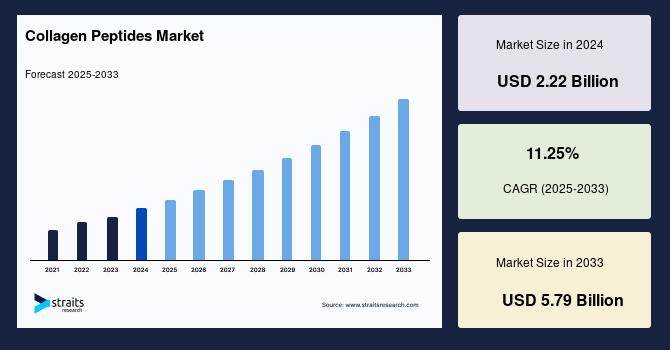The global collagen peptides market size was valued at USD 2.22 billion in 2024 and is projected to grow from USD 2.47 billion in 2025 to reach USD 5.79 billion by 2033, growing at a CAGR of 11.25% during the forecast period (2025–2033). The growth of the market is attributed to the rising geriatric demographic.
Key Drivers of Market Growth
The rising geriatric demographic globally is a significant factor fueling demand for collagen peptides. As the body's natural collagen production declines with age, consumers increasingly seek supplements to counteract wrinkles, joint pain, and bone deterioration. Collagen peptides, known for their excellent bioavailability and digestibility, have been widely embraced in the nutraceutical sector, especially for products targeting anti-aging, joint health, and overall wellness.
Health-conscious consumers and fitness enthusiasts are also propelling market expansion. Collagen's benefits in muscle repair and connective tissue support augment its popularity among athletes and gym-goers. Additionally, the beauty and personal care industry integrates collagen peptides into ingestible formats focused on skin rejuvenation and anti-aging effects. The trend towards clean-label, natural products further aligns with collagen peptides, which fit well in such formulations.
Emerging Preference for Marine-Based Sources
A notable shift in the market is the growing demand for marine-derived collagen peptides. Extracted from fish skin and scales, marine collagen offers superior bioavailability due to its smaller peptide size, facilitating better absorption. It appeals strongly to consumers with dietary restrictions such as pescatarians, as well as those following halal and kosher diets. Sustainability considerations also boost marine collagen’s appeal, as it often derives from seafood industry by-products, reducing waste while providing high-quality collagen.
The marine collagen segment is expected to expand rapidly, supported by increased adoption in beauty, wellness, and sports nutrition applications. This trend highlights the market’s responsiveness to consumer preferences for sustainable, ethical, and highly effective ingredients.
Regional Market Dynamics
North America is the largest market for collagen peptides, driven by heightened health awareness and a sophisticated nutraceutical industry that fosters innovation in supplements and functional foods. The demand for collagen-enriched products supporting anti-aging, joint health, and athletic performance is particularly strong in this region. Accessibility through diverse retail channels, including online platforms, accelerates market penetration across various consumer groups.
Asia-Pacific is the fastest-growing region, buoyed by expanding middle-class incomes, urbanization, and increasing health and beauty consciousness. Traditional acceptance of collagen in diets, especially for skin and wellness benefits, along with growing production capabilities and rising e-commerce penetration, supports the region’s growth trajectory. Countries like China and India are witnessing robust demand for collagen peptides in nutraceuticals and personal care markets.
Europe’s market growth is steady, characterized by consumer preference for clean-label, sustainable, and ethically sourced ingredients. Regulatory encouragement of functional foods and supplements enables innovation and product launches in medical nutrition, beauty, and wellness. The aging population, coupled with trends in personalized nutrition and biohacking, stimulates demand for collagen peptides. Marine-derived collagen’s environmental appeal also complements European consumers’ sustainability preferences.
Market Segmentation and Applications
Among collagen sources, bovine-derived peptides hold the largest share due to their abundant availability and cost-effective production processes. Bovine collagen is highly regarded for promoting joint, skin, and bone health, making it a favored ingredient in dietary supplements, cosmetics, and functional foods. Extensive scientific backing further fuels consumer trust and market adoption of bovine collagen peptides.
The powder form dominates the market owing to its versatility, ease of use, long shelf life, and convenience for incorporation into daily diets via smoothies, beverages, and food products without altering taste or texture. Its dosage flexibility and manufacturing advantages benefit both consumers and producers.
Applications of collagen peptides are widespread, with nutritional products forming a key segment. Growing health consciousness and increasing demand for products that support joint, bone, and muscle health underpin the rise of collagen-enriched dietary supplements, protein bars, and shakes. The aging global population and active lifestyles among younger consumers drive this demand. Collagen peptides also find use in cosmetics and pharmaceuticals, creating a diverse market landscape.
Challenges and Innovations
Despite the strong growth outlook, the high production costs and price volatility of raw materials pose significant challenges. Collagen peptides primarily come from bovine, porcine, or marine sources, all subject to supply fluctuations due to disease outbreaks, environmental factors, and geopolitical risks. Furthermore, extraction and hydrolysis require advanced, energy-intensive technologies and stringent quality controls, contributing to higher operational costs. These factors result in premium prices that can restrict mass-market availability, especially in price-sensitive regions.
Innovations aimed at enhancing consumer convenience and product appeal are emerging, including novel delivery formats like gummies, ready-to-drink beverages, and collagen shots. These innovations improve bioavailability and sensory experience, widening appeal and encouraging adoption.
Leading Market Players
Top companies are focusing on product innovation, sustainable sourcing, and clean-label formulations to meet evolving consumer expectations. They are also expanding into emerging markets and investing in research and development for marine and alternative sources.
One prominent player is Gelita AG, a German-based global leader in gelatin and collagen peptides. With over 2,800 employees and multiple production sites worldwide, Gelita offers tailor-made natural peptides for applications spanning food, nutrition, and pharmaceuticals. The company leverages strong R&D and sustainability initiatives and commands a significant share of the global market.
